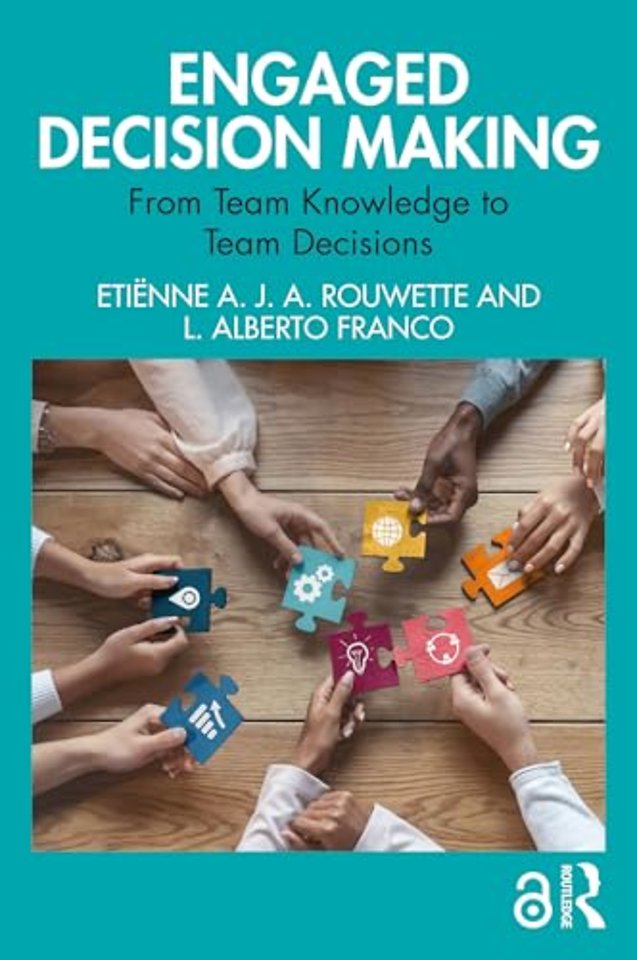Engaged Decision Making
From Team Knowledge to Team Decisions
Paperback Engels 2024 1e druk 9781032503516Samenvatting
In the knowledge economy, teams play a central role in decisions made within and across organisations. The reason why teams with diverse compositions are often used is arguably their ability to develop solutions that none of their members could have produced alone. Systems design, strategy and policy development, risk management, and innovation are just a few of the areas that call for team decisions.
Unfortunately, a considerable number of behavioural research studies show that teamwork is fraught with difficulties. Teams often underestimate their fallibility, struggle with conflict, or are unable to share and integrate critical information effectively. Indeed, the evidence shows that two out of three teams do not achieve their goals and half of organisational decisions – many of which are team decisions – fail.
In this book, the authors draw from research in psychology, decision and systems sciences – as well as their own research and consulting work that spans more than 20 years – to show how designed interventions can enable team decision making to become rigorous, transparent, and defensible. They cover theory and practice regarding the design, delivery, and evaluation of interventions to support team decision making in situations of varied complexity. Written as an applied resource for researchers and advanced students in particular, this book offers a guide to proven interventions that enhance the process of making team decisions and increase the chances of superior team results.
The Open Access version of this book, available at www.taylorfrancis.com, has been made available under a Creative Commons Attribution-Non Commercial-No Derivatives (CC-BY-NC-ND) 4.0 license.
Specificaties
Lezersrecensies
Inhoudsopgave
Chapter 1. Decision making traps
Chapter 2. Motivated team decision making
Chapter 3. Interventions to support team decisions
Part II. An overview of selected interventions
Chapter 4. Group model building: Understanding complex behaviour
Chapter 5. Application: Building the business model of Sioo management education
Chapter 6. Participatory scenario development: Thinking about the futur
Chapter 7. Application: Understanding possible futures of Nijmegen municipality
Chapter 8. Group causal mapping: Clarifying issues, understanding purpose and developing options
Chapter 9. Application: Prioritising projects to tackle teenage pregnancies in a multi-cultural neighbourhood (part I)
Etiënne A. J. A. Rouwette and L. Alberto Franco with Ewan Lord
Chapter 10. Decision conferencing: Articulating value preferences and trade-offs
Chapter 11. Application: Prioritising projects to tackle teenage pregnancies in a multi-cultural neighbourhood (part II)
Etiënne A. J. A. Rouwette and L. Alberto Franco with Ewan Lord
Part III. Performing interventions
Chapter 12. Design choices
Chapter 13. Basics of facilitation
Chapter 14. Managing process and content
Chapter 15. Managing conflict and emotion
Part IV. Researching interventions
Chapter 16. Are interventions used in practice and do they really work?
Chapter 17. Building skills for the study and practice of interventions
Anderen die dit boek kochten, kochten ook
Rubrieken
- advisering
- algemeen management
- coaching en trainen
- communicatie en media
- economie
- financieel management
- inkoop en logistiek
- internet en social media
- it-management / ict
- juridisch
- leiderschap
- marketing
- mens en maatschappij
- non-profit
- ondernemen
- organisatiekunde
- personal finance
- personeelsmanagement
- persoonlijke effectiviteit
- projectmanagement
- psychologie
- reclame en verkoop
- strategisch management
- verandermanagement
- werk en loopbaan







